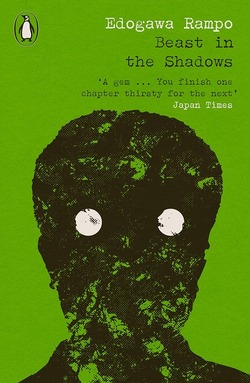The narrator of Edogawa Rampo’s Beast in the Shadows (1928, tr: Ian Hughes, 2006) suggests there are two categories of detective novelist. While he views himself as the type interested in the intellectual challenge of detection, it’s the other – excited by the crime itself – that leads the mystery in this slim but impactful work recently reissued under the new Penguin Crime & Espionage Classics series.
It’s a chance encounter with a married woman that leads into a mystery centred on a reclusive crime writer. Oyamada Shizuko is married to Rokurō, a high-flying businessman, and fears her pre-marital secrets being revealed to him by an old flame believed to be writing under the pseudonym Ōe Shundei. She’s been receiving letters that suggest an awareness of her every movement and threaten her life, therefore she brings the narrator into her confidence to help resolve the issue.
A dark seam runs through the narrative in the same way a curious welt runs down the back of the novel’s femme fatale. Rampo takes us to dark places, charging this traditional golden age crime with a sexual frisson that veers into voyeurism and sadomasochism. There’s a metafictional game afoot too, with references to Rampo’s earlier tales, and the initial categorisation of detective novelists referring to both book and plot.
Rampo is clearly having fun playing with his story, attributing his own works to the fictional Ōe, and when the case is wrapped up with many pages to go, one can only expect to have any expectations yanked out from under their feet, which Rampo duly does. A meditation on detection, facts, and their interpretation is the reader’s reward. Having led our hands into the unknown he is content to leave us there pondering unanswerable questions.
Beast in the Shadows is more than a vintage crime with darker notes, but a work that shines the interrogative spotlight on the idea of detection. Its central sleuth is no detective, but enjoys the challenge, much as Rampo does the same. It races through identity, sexuality, uncertainty, and more, flipping its facts with regularity as it bears down on the idea that the facts of a case are, like a book itself, open to interpretation.
